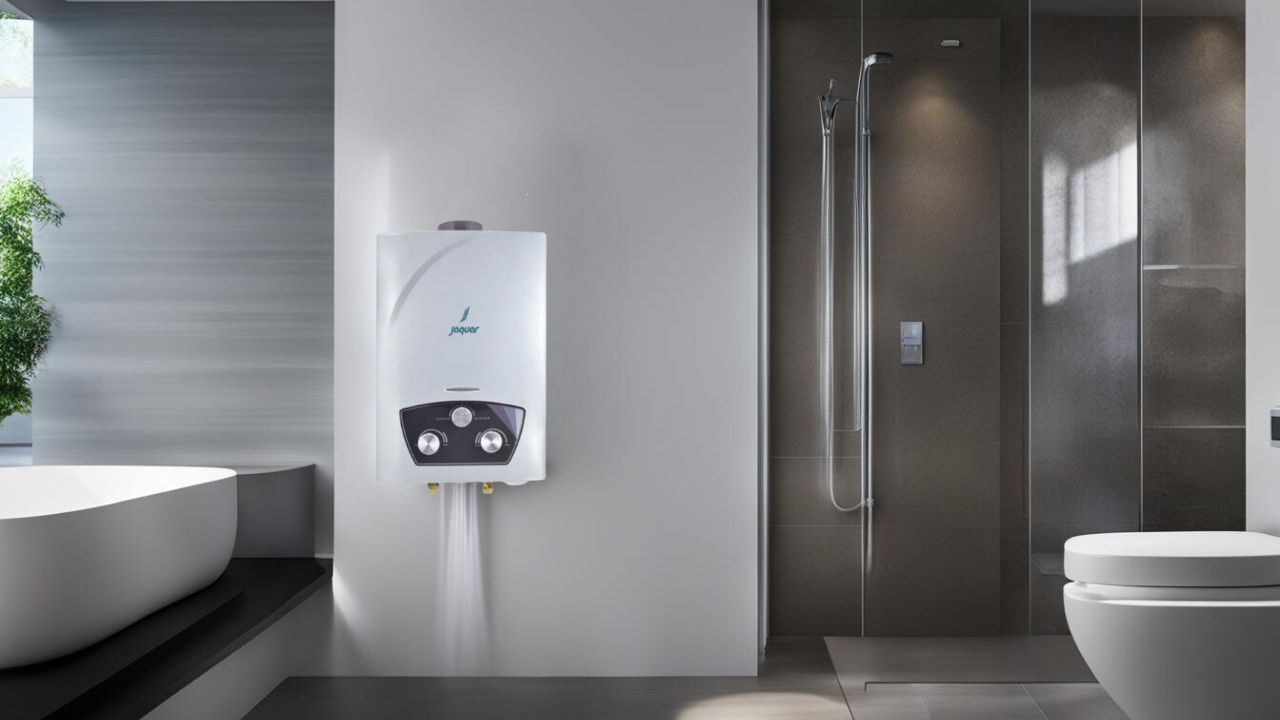Your water heater is one of the biggest energy users in your home, accounting for up to 30% of utility costs. Old, inefficient models can really drive up your energy bills. By optimizing your water heater settings and maintenance, you can maximize efficiency and savings.
Follow these 10 tips:
1. Lower the Temperature Setting
Turn down your water heater's temperature setting to 120°F or lower. This prevents excessive heating beyond what's needed for comfortable use. For each 10°F reduction, you can save up to 5% on water heating costs.
2. Use a Water Heater Blanket
Insulating your water heater with a water heater blanket reduces standby heat loss, allowing it to operate more efficiently. Ensure it fits snugly and covers the top and sides. DIY kits start around $20. Proper installation is key.
3. Drain Sediment Regularly
 Credits: Jaquar
Credits: Jaquar
Drain a quart of water from the tank's bottom valve annually to flush sediment that impedes heat transfer and traps heat. Instructions are in your manual. Doing this extends your water heater’s life.
4. Install Heat Traps
Installing heat trap fittings on the hot and cold supply lines prevents convection heat loss up the pipes.
5. Insulate Pipes
Insulating exposed hot water pipes with pre-split foam tubing maintains water heat as it travels to fixtures. This reduces the amount of re-heating needed.
6. Use Flow Restrictors

Credits: Jaquar
Installing low-flow showerheads and faucet aerators reduces the amount of hot water used. Less water used means less energy needed for heating. Look for WaterSense certified models.
7. Fix Dripping Faucets
Just one dripping faucet can waste hundreds of gallons monthly requiring constant heating. Fixing leaks saves water and the energy to reheat more.
8. Shorten Showers
Taking shorter showers saves gallons of hot water and the energy needed to heat more. Just shaving 1-2 minutes can make a difference.
9. Wash Full Loads
Run full loads in your dishwasher and clothes washer to maximize the hot water used per cycle. That means more efficient water heating rather than heating water for partial loads spread out.
10. Upgrade If Old
If your water heater is more than 10 years old, replace it with a new energy-efficient model to reap savings on your utility bill. Each unit has an expected lifespan.
With some simple adjustments, maintenance, and everyday usage habits, you can operate your water heater in the most efficient, cost-effective way possible. Be diligent to maximize savings.
How Your Water Heater Works
To understand how to optimize efficiency, it helps to know the basic operation of home water heaters:
Water heaters have a storage tank that is constantly filled with pressurized water from your home's main cold water supply line. Inside the tank, gas burners or electric heating elements heat the water.
A thermostat and thermometer regulate temperature. As hot water leaves the tank when you use a fixture, cold supply water enters to re-fill the tank and be heated. This cycle continues 24/7 to ensure hot water is ready when needed.
Losing heat from the tank, pipes, or usage waste makes your heater work harder, using more energy. Optimizing efficiency minimizes this waste.
Water Heater Types and Efficiency Comparison

Credits: Jaquar
Two main types of water heaters include:
Conventional Storage Tank
An insulated tank constantly maintains a set volume of hot water ready for use. Natural gas or electric heating.
Tankless On-Demand
Heats water only as demanded. More energy efficient but endless hot water has tradeoffs.
Here is how the efficiencies of different models compare:
- Electric storage tank - 90%+ efficient
- Natural gas storage tank - 65-80% efficient
- Tankless gas condensing - Up to 98% efficient
- Tankless electric - 99% efficient
While tankless models are most efficient, proper maintenance optimizes any hot water heater.
Checklist to Diagnose Water Heater Inefficiencies
Notice any of these signs? Your water heater may be operating inefficiently:
- High energy bills from increased gas or electric use
- Hot water runs out quickly during showers or use
- Rumbling, popping, or percolating sounds
- Drips or leaks from tank, valves or pipes
- Long wait times for hot water at fixtures
- Discolored/stained water
- Rust accumulation on exterior or from taps
Don't ignore inefficiency symptoms. A service checkup can identify underlying issues.
Protect Components That Impact Efficiency

Credits: Jaquar
Key water heater parts that impact efficient operation include:
Insulation – Retains heat. Ensure jacket insulation is dry and fully surrounding tank.
Burner/Heating Elements – Transfer energy efficiently into the water. Replace if corroded or mineral-caked.
Thermostat – Maintains optimal temperature. Calibrate or replace if readings are off.
Relief Valve – Releases excess pressure. Must be rated to tank temperature/pressure.
Anodes – Curb corrosion. Inspect and replace magnesium/aluminum anode rod when depleted.
Gaskets – Seal in heat. Replace cracked inlet/outlet gaskets allowing heat loss.
Take proactive steps to maintain components that directly influence efficiency.
Be Smart About Water Heater Location
Where you install your water heater impacts efficiency:
- Centrally located near water use points to minimize pipe distances and heat loss.
- Install in conditioned indoor spaces, not outside rooms subject to elements.
- Ensure adequate clearance for ventilation, servicing and insulation access.
- Keep the area clean and dry to prevent corrosion and insulation mold.
Take the location into account when installing a new unit or considering relocating your existing heater. This small factor makes a difference.
New Efficient Water Heater Options
When buying a new water heater, look for energy-saving features:
- Heat pump models extract heat from surrounding air.
- Hybrid heat pump + storage tanks balance efficiency and hot water capacity.
- Condensing technology recycles heat exhaust.
- Integrated mixing valves for tempering hot water as needed.
- Improved insulation like foam covers.
- Larger tanks store more pre-heated water.
Choose Energy Star certified and high EF (Energy Factor) rated units.
Jaquar Water Heaters: Best Water Geyser in India for Your Bathroom

Credits: Jaquar
When selecting a new water heater, choose quality and reliability you can count on. Jaquar offers some of the finest electric water heaters and geysers on the market to provide efficient and safe hot water for all your needs.
Jaquar water heaters like the Elena Digital model feature superior glass-lined tanks that prevent corrosion and rust. The CFC-free insulation minimizes heat loss. Backed by a 7-year warranty, intuitive digital controls, and a fast 3kW heating element, a Jaquar geyser consistently delivers hot water when you need it.
The innovative Jaquar Eva induction water heater heats water electro-magnetically so there’s no tank to corrode or leak over time. Jaquar ensures safety with integrated earth leakage protection and flame retardant materials.
For the ultimate convenience, the Livra instant water heater instantly heats water on demand like a tankless model so you never run out of hot water.
With cutting-edge safety features like dual thermostats and multi-function valves, long lasting tank construction, and energy efficient technology, Jaquar water heaters provide reliable performance with savings. Discover the perfect geyser or electric water heater for your home from the Jaquar lineup today!
Choosing the Right Water Heater Size
When selecting a new water heater, an important factor is choosing the appropriate capacity tank size to meet your household's hot water needs:
Small Tank Sizes
- Best for households with conservation-minded usage
Medium Tank Sizes
- Allow moderate hot water usage
Large Tank Sizes
- Support frequent and lengthy hot water usage
Consider daily routines, peak usage times, and number of occupants to determine the ideal tank capacity. Oversizing wastes energy and money.
Tankless Water Heaters: Pros and Cons

Credits: Jaquar
Tankless water heaters heat water instantaneously rather than storing heated water:
Pros
- Compact, wall-mounted design
- Unlimited hot water capacity on demand
- Higher energy efficiency than tank models
- Reduce energy costs by 30% or more
Cons
- Require larger gas lines or electrical wiring upgrades
- Possible flow limitations depending on home size
- Cold spurts as heater fires up may annoy some users
Tankless models excel for energy savings but the endless hot water comes with some tradeoffs.
Maintaining Water Heaters for Efficiency and Longevity
Along with optimizing settings and usage, proper maintenance maximizes your water heater's operating life and efficiency:
- Drain and flush tank sediment annually using the T&P valve. Prevent buildup.
- Inspect anode rods every 2-3 years and replace them if over 60% worn out. Critical for corrosion protection.
- Check valves, pipe fittings, and seals for leaks annually. Drips waste heat and water.
- Clean burner assembly and test combustion if your unit is gas-powered. Keep it running cleanly.
- Replace heating elements that are corroded or coated in mineral deposits. Ensure good heat transfer.
- Test T&P relief valve operation annually by briefly opening the release lever. Confirm it's not stuck shut.
Don't neglect preventative maintenance which extends the operating life and efficiency of your water heating appliance.
Signs It's Time to Replace Your Water Heater

Credits: Jaquar
If your current water heater is over 10 years old, watch for these signs it may be time to replace it with a new efficient model:
- Frequent breakdowns and need for repairs
- Rust accumulation on the tank exterior
- Persistent leaks from valves, fittings, or the tank itself
- Loud rumbling or unusual noises during operation
- Long delays to receive hot water at faucets
- Not enough hot water capacity for household needs
- High energy bills from inefficient operation
Replacing an aging, inefficient unit with a new energy-efficient model can pay for itself within a few years through utility savings.
Hiring a Professional for Installation and Repairs
While DIY maintenance is possible for many homeowners, consider hiring a professional service technician for:
- Installation of new water heaters, especially if electrical or gas line work needed
- In-depth diagnostic testing if experiencing efficiency issues
- Sediment flushing from large commercial-grade tanks
- Complicated part replacements like heating elements or thermostats
- Fixes requiring drainage and removal of the entire water heater unit
Proper installation and repairs help ensure your water heater operates safely and efficiently. Trust a professional when plumbing expertise is needed.
Conclusion
Boosting your household water heater’s efficiency pays dividends through lower energy usage and utility bills. Follow preventative maintenance best practices and optimize your usage habits. When purchasing new units, invest in higher efficiency models with innovative features. Take a proactive approach to maximize your water heater’s performance and savings. A little time and effort goes a long way to optimize this major home appliance.


